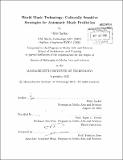World music technology : culturally sensitive strategies for automatic music prediction
Author(s)
Sarkar, Mihir, Ph. D. Massachusetts Institute of Technology.
DownloadFull printable version (9.332Mb)
Alternative title
Culturally sensitive strategies for automatic music prediction
Other Contributors
Massachusetts Institute of Technology. Dept. of Architecture. Program in Media Arts and Sciences.
Advisor
Barry L. Vercoe.
Terms of use
Metadata
Show full item recordAbstract
Music has been shown to form an essential part of the human experience-every known society engages in music. However, as universal as it may be, music has evolved into a variety of genres, peculiar to particular cultures. In fact people acquire musical skill, understanding, and appreciation specific to the music they have been exposed to. This process of enculturation builds mental structures that form the cognitive basis for musical expectation. In this thesis I argue that in order for machines to perform musical tasks like humans do, in particular to predict music, they need to be subjected to a similar enculturation process by design. This work is grounded in an information theoretic framework that takes cultural context into account. I introduce a measure of musical entropy to analyze the predictability of musical events as a function of prior musical exposure. Then I discuss computational models for music representation that are informed by genre-specific containers for musical elements like notes. Finally I propose a software framework for automatic music prediction. The system extracts a lexicon of melodic, or timbral, and rhythmic primitives from audio, and generates a hierarchical grammar to represent the structure of a particular musical form. To improve prediction accuracy, context can be switched with cultural plug-ins that are designed for specific musical instruments and genres. In listening experiments involving music synthesis a culture-specific design fares significantly better than a culture-agnostic one. Hence my findings support the importance of computational enculturation for automatic music prediction. Furthermore I suggest that in order to sustain and cultivate the diversity of musical traditions around the world it is indispensable that we design culturally sensitive music technology.
Description
Thesis (Ph. D.)--Massachusetts Institute of Technology, School of Architecture and Planning, Program in Media Arts and Sciences, 2012. Cataloged from PDF version of thesis. Includes bibliographical references (p. 103-112).
Date issued
2012Department
Program in Media Arts and Sciences (Massachusetts Institute of Technology)Publisher
Massachusetts Institute of Technology
Keywords
Architecture. Program in Media Arts and Sciences.